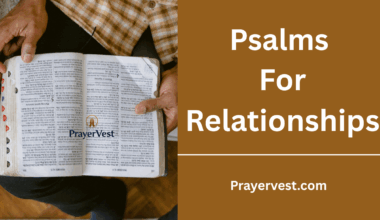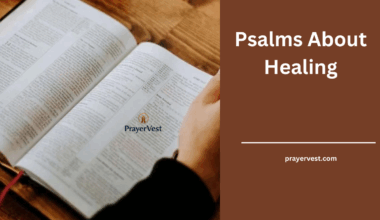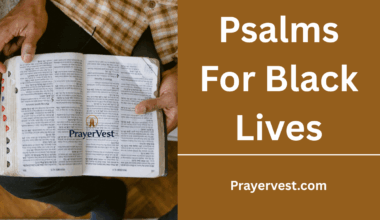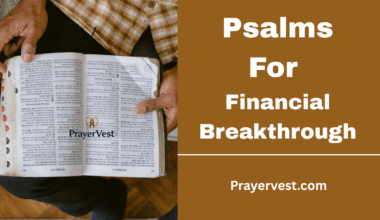In Christian burial rites, the book of Psalms has long been revered because it provides consoling, uplifting, and reassuring words during difficult times. The Psalms for a funeral mass are a spiritual salve that gently reminds mourners of God’s everlasting presence during a funeral Mass, when hearts are heavy and emotions are running high.
These age-old tunes ground the soul in heavenly truth while expressing the whole spectrum of human grief and desire. The Psalms convey the anguish of loss and the hope of resurrection, whether read aloud in a responsorial manner or silently during introspection.
The Psalms highlight God’s enduring nature—His justice, His kindness, and His unwavering love—in the face of grief. They serve as a reminder that dying is not the end but rather the beginning of an eternal existence with the Creator.
God is a faithful shepherd who walks with us even through the valley of the shadow of death, a haven for the brokenhearted, and a haven in the storm, according to psalm after psalm. While clinging to the prospect of peace and reunion, this sacred poetry assists mourners in expressing their pain in God’s presence.
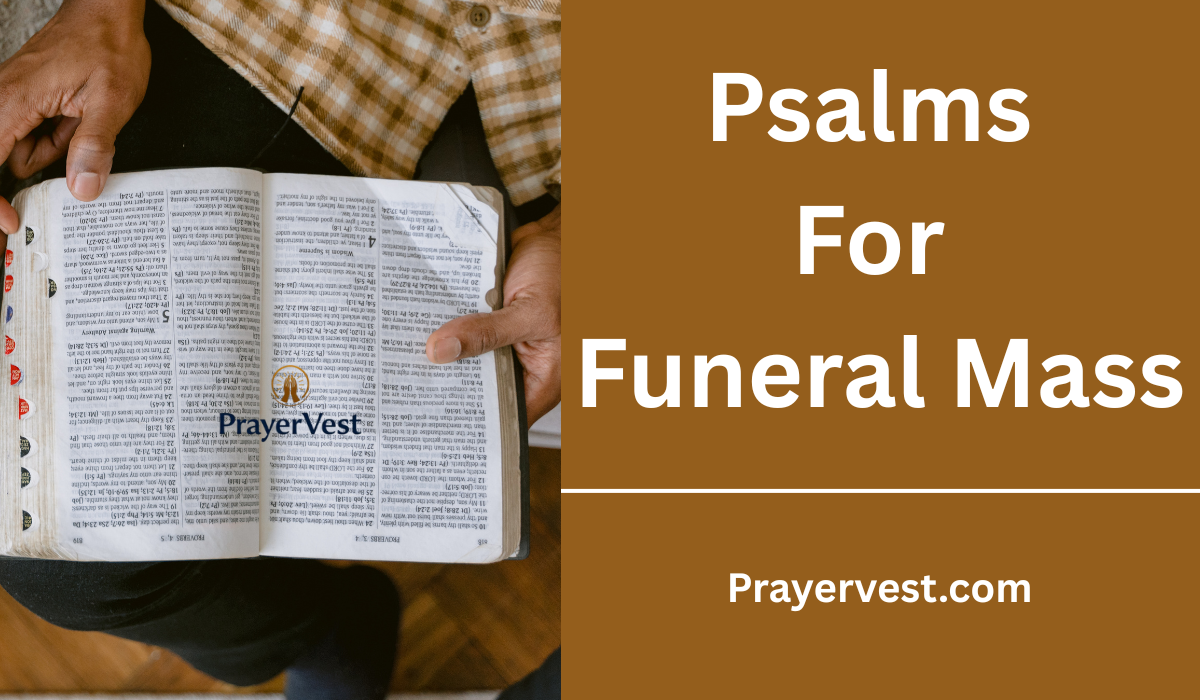

Selecting Psalms for a funeral Mass is more than just a liturgical choice; it’s a spiritual act of putting the deceased person in God’s care and asking Him to console the bereaved. These lyrics memorialize the life of the departed while reinforcing faith in God’s promises, serving as both prayer and proclamation. The Psalms offer timeless expressions of faith that sustain us through the darkest moments with grace and hope, whether we are looking for words to comfort, bless, or contemplate.
50 Most Comforting Psalms For Funeral Mass (2026)
1. Psalm 23:4
“Even though I walk through the valley of the shadow of death, I will fear no evil, for you are with me; your rod and your staff, they comfort me.”
In this beloved verse, the psalmist walks through the darkest of valleys—a poetic symbol for death itself—yet remains unshaken. The imagery of the rod and staff paints a picture of divine guardianship and comfort, reminding us that even in the face of death, God is present. His guidance doesn’t cease when life does; instead, it becomes our greatest hope in passing from this world to the next.
Reflection
During a funeral, this verse becomes an anthem of assurance. It tells grieving hearts that death is not the end, but a shadow—a passageway. The presence of God does not abandon us in sorrow, nor does it retreat in the face of death. He walks with us, sustains us, and ultimately receives us. This Psalm offers deep solace, reminding the bereaved that their loved one did not walk that final valley alone—and neither do they now in their grief.
2. Psalm 34:18
“The Lord is close to the brokenhearted and saves those who are crushed in spirit.”
This verse delivers a profound truth about God’s nearness in seasons of emotional devastation. When hearts are shattered by loss and the spirit is weighed down by grief, the Lord draws especially near. His salvation here is not only spiritual but emotional—an intimate comfort offered to those mourning the loss of someone dear.
Reflection
Funeral Masses are sacred pauses in time, moments when the heart cries out for nearness, not answers. This Psalm reminds us that God does not remain distant in our sorrow. He steps into it. He cups the tears, steadies the soul, and ministers in whispers. His presence may not erase the pain, but it restores meaning while mourning. Those who are crushed are not cast aside—they are carried.
3. Psalm 116:15
“Precious in the sight of the Lord is the death of his faithful servants.”
In the economy of heaven, the death of the righteous is not tragic but treasured. This verse shifts our perspective from the temporal pain of separation to the eternal value of a life lived in devotion to God. It emphasizes that those who die in faith are not lost but lovingly welcomed into God’s presence.
Reflection
This verse comforts the bereaved with the truth that their loved one’s passing is not meaningless. God values the moment of homecoming. What appears as a loss to us is a gain to heaven. A funeral is not merely a goodbye—it is heaven’s celebration of a life that honored the Lord. The sorrow of earth meets the joy of eternity in this sacred transition.
4. Psalm 73:26
“My flesh and my heart may fail, but God is the strength of my heart and my portion forever.”
This verse captures the fragility of human life while affirming the eternal sufficiency of God. As the body fades and the heart weakens, our ultimate security is not in longevity but in the eternal God who upholds our soul. “Portion forever” speaks of inheritance, reminding us that death is not an end, but a transition into everlasting union with God.
Reflection
Funerals often confront us with the reality of mortality, but this verse assures us of an unshakable hope. Our true treasure isn’t in this life—it’s in God Himself. When we say goodbye to a loved one, we do so clinging to the truth that they are now in the arms of their eternal portion. And for those left behind, this same God remains the strength that steadies the grieving heart.
5. Psalm 90:12
“Teach us to number our days, that we may gain a heart of wisdom.”
Psalm 90 is a sobering meditation on the brevity of life. This particular verse urges us to live with eternal perspective—to count each day not as a right, but as a gift. Wisdom comes not from fearing death, but from recognizing its inevitability and using that knowledge to live intentionally for God’s glory.
Reflection
A funeral Mass is a time not only to remember the departed, but to reflect on our own lives. This verse calls us to sobriety and wisdom—to ask, “What will I do with the days I have left?” The passing of a loved one becomes a holy invitation to reorder our priorities, deepen our faith, and live lives worthy of remembrance and eternal reward.
6. Psalm 39:4-5
“Show me, Lord, my life’s end and the number of my days; let me know how fleeting my life is. You have made my days a mere handbreadth; the span of my years is as nothing before you.”
This passage reminds us of the transience of life. The psalmist doesn’t shy away from contemplating death; instead, he asks God to help him grasp how brief human life truly is. This humble awareness leads not to despair, but to reverent dependence on God’s eternal nature.
Reflection
At a funeral, these verses echo the sentiments of every mourner: life is short. But in acknowledging our mortality, we gain eternal clarity. We are not here forever—yet we are not forgotten. God, in His infinite love, holds our short span in His eternal hand. The psalmist’s prayer becomes ours: Lord, help us live meaningfully in the time You’ve given us.
7. Psalm 27:1
“The Lord is my light and my salvation—whom shall I fear? The Lord is the stronghold of my life—of whom shall I be afraid?”
This declaration of faith offers bold courage in the face of life’s greatest uncertainties, including death. David’s confidence is not rooted in circumstances but in who God is: light in darkness, salvation in despair, and strength in weakness. It’s a proclamation that death holds no terror when God is our fortress.
Reflection
In moments of loss, fear often rises—fear of living without the one who’s gone, fear of our mortality. Yet this verse dispels fear with faith. The God who has been our strength in life remains our shelter in grief. For those who died in the Lord, salvation has been fulfilled; and for those who mourn, the same Lord offers unshakeable hope and peace.
8. Psalm 4:8
“In peace I will lie down and sleep, for you alone, Lord, make me dwell in safety.”
This verse is a beautiful expression of trust in God’s protective presence. Though originally spoken as a prayer for sleep, it resonates deeply at a funeral Mass as an image of resting in God through death. It reminds us that eternal safety is found only in the Lord.
Reflection
There is no greater peace than knowing that our loved one now sleeps in God’s care. This verse turns sorrow into serenity, showing us that death, for the believer, is a peaceful transition into divine safety. Just as we rest in sleep, so do the faithful rest eternally in the embrace of God, free from all fear and harm.
9. Psalm 121:1-2
“I lift up my eyes to the mountains—where does my help come from? My help comes from the Lord, the Maker of heaven and earth.”
In the face of grief, the psalmist points our gaze upward. The help we need in sorrow does not come from within but from above—from the God who created the heavens and earth. This is a reminder that comfort, strength, and healing are found not in our strength but in His sovereignty.
Reflection
At a funeral Mass, emotions run deep—grief, confusion, emptiness. This verse invites mourners to lift their eyes, to seek divine help beyond human understanding. The Creator of all things is also the Comforter of broken hearts. He meets us in the valley of sorrow and offers strength that does not fade and hope that does not disappoint.
10. Psalm 147:3
“He heals the brokenhearted and binds up their wounds.”
This verse offers tender reassurance to those mourning loss. God is not distant from pain—He enters into it with us. His healing is not superficial but intimate, like a physician carefully binding wounds with compassion and care. Grief is honored in this Psalm, not dismissed.
Reflection
Grieving hearts often feel shattered and raw. But this verse assures us that God is actively involved in the mending process. At a funeral Mass, it reminds every soul that healing is not only possible—it is promised. The pain may not vanish immediately, but it will be gently wrapped in divine love until wholeness is restored.
11. Psalm 46:1
“God is our refuge and strength, an ever-present help in trouble.”
In times of sorrow and crisis, the psalmist proclaims God as both a refuge—our shelter—and strength—our power to endure. His presence is not delayed or distant; He is “ever-present,” intimately near when we need Him most. This makes the verse a foundation of faith in moments when life feels most unstable.
Reflection
Funerals bring a storm of emotions—loss, confusion, aching absence. But amid the chaos, this verse reminds us of a powerful truth: God is not absent. He is with us, right in the center of the heartbreak. His presence doesn’t just offer comfort—it becomes our lifeline. In His embrace, we find the strength to mourn with hope and continue forward in grace.
12. Psalm 30:5
“Weeping may endure for a night, but joy comes in the morning.”
Grief is acknowledged honestly here—not rushed, not dismissed. Yet it’s also given a boundary. The night of sorrow is real, but it is not forever. This verse promises that, for those who trust in God, sorrow will eventually give way to joy, both in this life and in eternity.
Reflection
At a funeral Mass, tears flow freely—and they should. But this Psalm offers a gentle whisper amid mourning: there will be joy again. Whether it’s the joy of reunion in eternity or the quiet healing that comes with time, God’s promise is that morning will come. This verse is a sacred reminder that even in grief, resurrection is on the horizon.
13. Psalm 37:18
“The blameless spend their days under the Lord’s care, and their inheritance will endure forever.”
This verse affirms the ongoing care God provides for the righteous, not just in life but in death. The inheritance spoken of is eternal, unfading, and secure. It assures the faithful that they are never outside of God’s reach, even in the grave.
Reflection
When we grieve someone who lived a life of quiet faithfulness, this Psalm brings immense comfort. Their days were not unnoticed. Their soul is not lost. They now enjoy the inheritance that never perishes. It gives mourners peace to know that the one they love is not only remembered by them but cherished by God eternally.
14. Psalm 84:10
“Better is one day in your courts than a thousand elsewhere.”
This verse captures the longing of the soul to be in God’s presence. It places eternal communion with the Lord above all earthly pleasures. For the faithful departed, this is not a future hope—it is their present reality.
Reflection
At a funeral, this verse helps reframe our loss. Though we mourn the absence of a loved one, we celebrate the reality that they are now where their soul has always longed to be—in the courts of God. The best day on earth cannot compare to what they now experience in His presence. That truth transforms grief into quiet celebration.
15. Psalm 55:22
“Cast your cares on the Lord and he will sustain you; he will never let the righteous be shaken.”
This verse invites us to bring our burdens—including the burden of grief—to God. It reassures us that God doesn’t just hear our cries; He sustains us under the weight of them. The righteous are held steady not by their strength, but by His unfailing hand.
Reflection
Mourning is heavy, and some days feel unbearable. But this Psalm offers sacred comfort: you don’t have to carry it alone. God welcomes our sorrow, and in return, offers His sustaining power. For the grieving heart, this is hope in action—divine support for every tear, every ache, every step forward.
16. Psalm 42:11
“Why, my soul, are you downcast? Why so disturbed within me? Put your hope in God, for I will yet praise him, my Savior and my God.”
The psalmist wrestles with sorrow, but doesn’t let despair have the final word. He talks to his soul like a friend, urging it toward hope. This verse is an honest reflection of the grieving process—acknowledging the depth of sadness while clinging fiercely to faith.
Reflection
A funeral can stir a tidal wave of sorrow, but this verse meets us in that grief. It doesn’t tell us to ignore our pain, but to speak to it—to call it into hope. Even in mourning, praise is possible. Even in darkness, light is coming. God invites us not to suppress our sorrow, but to sanctify it by turning our gaze back to Him.
17. Psalm 31:5
“Into your hands I commit my spirit; deliver me, Lord, my faithful God.”
These are the same words Jesus quoted on the cross. They are an offering of total surrender to the will and care of God. For the believer, death is not a terrifying end, but a yielding of the spirit into faithful hands.
Reflection
When we grieve someone who trusted in Christ, this verse becomes their final testimony. Their spirit has been safely placed in God’s hands. And in this act of surrender, there is peace. As mourners, we find rest too, knowing that the one we love is no longer suffering, but is forever secure with the One who is faithful unto death and beyond.
18. Psalm 116:7
“Return to your rest, my soul, for the Lord has been good to you.”
This verse is a command to the soul—to come back to peace, to remember God’s faithfulness. It acknowledges that sorrow and restlessness come, but God’s goodness remains. It is a spiritual recalibration in the face of pain.
Reflection
Grief can make the soul wander, lost in memories, regrets, or longing. But this Psalm gently calls us back. Back to rest, back to the truth that God is still good, even when life hurts. In remembering God’s faithfulness, the soul finds anchoring again. For those at a funeral Mass, this verse is a healing balm.
19. Psalm 17:15
“As for me, I will be vindicated and will see your face; when I awake, I will be satisfied with seeing your likeness.”
This verse points to the resurrection hope—the vision of God that awaits the faithful after death. The “awakening” refers not to sleep but to the eternal awakening of the soul into God’s presence. That vision brings perfect satisfaction.
Reflection
What greater comfort is there at a funeral than to know our loved one now sees God’s face? This Psalm affirms that the faithful do not end in darkness, but awaken to glory. The beauty of the afterlife is not golden streets or angelic songs—it’s the face of God. That is the inheritance of every soul who dies in Christ.
20. Psalm 103:15-17
“The life of mortals is like grass, they flourish like a flower of the field… But from everlasting to everlasting the Lord’s love is with those who fear him.”
The contrast in this verse is powerful: human life is brief and fading, but God’s love is eternal and unshakable. Though our bodies return to the dust, His covenant love stands forever, embracing those who revered Him.
Reflection
This verse humbles and uplifts. It acknowledges how fragile we are—like flowers, we bloom and wither. Yet those who belong to the Lord are held in an everlasting love that transcends time. At a funeral Mass, this truth wraps around grieving hearts like a promise: though life is short, love is eternal. And God’s love never lets go.
21. Psalm 27:13-14
“I remain confident of this: I will see the goodness of the Lord in the land of the living. Wait for the Lord; be strong and take heart and wait for the Lord.”
David expresses unshaken hope, even in the face of danger and distress. He believes that the Lord’s goodness is not confined to eternity but begins even now. Yet he acknowledges that waiting—often through pain—is part of the journey of faith.
Reflection
At a funeral Mass, these words offer a lifeline of hope. They invite the grieving to trust that goodness still lies ahead, even through the veil of sorrow. It reminds mourners to be strong, not in denial, but in expectation. For those who have died in Christ, they already see that goodness. For those left behind, this Psalm calls us to hope while we wait.
22. Psalm 145:18-19
“The Lord is near to all who call on him, to all who call on him in truth. He fulfills the desires of those who fear him; he hears their cry and saves them.”
This passage celebrates the nearness of God. He is not aloof nor indifferent. When we cry out to Him in sincerity, He listens and acts. This verse affirms God’s compassion, especially to those who suffer and mourn.
Reflection
Grief often tempts us to feel abandoned, yet this verse proclaims a greater truth: God is close. He bends low to hear the cries of His people. At a funeral, these words assure us that every sob, every silent ache, is seen and heard. He is not just present—He is attentive, responsive, and saving.
23. Psalm 25:6-7
“Remember, Lord, your great mercy and love, for they are from of old. Do not remember the sins of my youth and my rebellious ways; according to your love remember me, for you, Lord, are good.”
This is a plea for God’s mercy and for a legacy not defined by sin, but by His love. The psalmist seeks remembrance not for his failures, but for God’s faithful goodness. It is a heartfelt prayer that God sees us through the lens of mercy.
Reflection
When we mourn a loved one, we often reflect on their life—their joys, their regrets, their journey. This Psalm gently reminds us that God looks at us through love. Their life is not reduced to their mistakes. God’s memory is redemptive. And in His mercy, every life surrendered to Him is wrapped in grace.
24. Psalm 40:1-2
“I waited patiently for the Lord; he turned to me and heard my cry. He lifted me out of the slimy pit… and gave me a firm place to stand.”
This Psalm speaks of rescue and restoration. God does not merely hear cries—He acts on them. He draws us out of despair and gives us stability, even when the ground beneath us has crumbled.
Reflection
Grief feels like a pit—dark, consuming, and bottomless. But this Psalm testifies that God reaches into that place and lifts us up. At a funeral, these words comfort those who feel overwhelmed by loss. They remind us that while we mourn, God is already at work restoring our footing and reestablishing our hope.
25. Psalm 49:15
“But God will redeem me from the realm of the dead; he will surely take me to himself.”
This verse reveals the hope of resurrection centuries before Christ. The psalmist is confident not in earthly wealth or legacy, but in God’s power to redeem from death itself. It is a bold declaration of eternal life.
Reflection
At a funeral Mass, this verse proclaims the great Christian hope—resurrection. The grave is not the end. Those who trust in the Lord are not left behind but are taken to Him. We mourn the absence of our loved one, but we rejoice that they are now in the embrace of their Redeemer.
26. Psalm 63:1
“You, God, are my God, earnestly I seek you; I thirst for you, my whole being longs for you.”
This verse describes a soul yearning deeply for God, recognizing that He alone satisfies our deepest needs. It portrays a profound spiritual hunger—a longing that is fully answered in eternity.
Reflection
As we remember someone who has passed, this verse reminds us that the longings of their heart are now fulfilled. Their thirst for God has been quenched by His eternal presence. And for those who remain, it calls us to seek God with that same holy hunger, knowing He alone can satisfy the soul, both now and forever.
27. Psalm 56:8
“Record my misery; list my tears on your scroll—are they not in your record?”
This tender verse reveals that none of our sorrow is wasted or forgotten. Every tear is noted by God. Our grief is not brushed aside—it is honored and remembered by the One who loves us most.
Reflection
Funeral services are full of tears—silent and spoken, hidden and seen. This Psalm assures us that every tear matters to God. He keeps a record not to shame us, but to assure us that our pain has been seen, counted, and will one day be healed in full. Nothing escapes His tender care.
28. Psalm 19:14
“May these words of my mouth and this meditation of my heart be pleasing in your sight, Lord, my Rock and my Redeemer.”
This is a prayer for a life and legacy that honors God, not just in speech, but in heart and spirit. It reminds us that what pleases the Lord is not only what we say, but what we are.
Reflection
As we remember the life of someone we loved, this verse invites reflection on legacy. Did their life please the Lord? Were they known for integrity and quiet faith? It also becomes our prayer—to live and die in such a way that our final breath is an offering of praise to our Rock and Redeemer.
29. Psalm 48:14
“For this God is our God for ever and ever; he will be our guide even to the end.”
This verse proclaims a truth that transcends death: God remains our God forever. His care does not stop at the grave. He leads us through life, through death, and into eternity.
Reflection
This is one of the most comforting truths at a funeral: that death is not a departure from God’s guidance. It is, in fact, the final step in His divine leading. Our loved one did not walk into eternity alone—God was their guide. And He continues to be our guide, through every sorrow and into everlasting joy.
30. Psalm 138:3
“When I called, you answered me; you greatly emboldened me.”
This verse is a testimony of answered prayer and inner strength given by God. In moments of great weakness and need, God not only hears but emboldens His people with divine strength.
Reflection
In the face of loss, strength often feels far away. Yet this Psalm reminds us that the strength we need is not summoned from within—it is sent from above. At a funeral, these words reassure the grieving that their cries are heard, and their courage will be restored by the God who always answers.
31. Psalm 61:1-2
“Hear my cry, O God; listen to my prayer. From the ends of the earth I call to you, I call as my heart grows faint; lead me to the rock that is higher than I.”
This is the voice of a weary heart crying out for stability. The psalmist seeks not only to be heard but to be anchored—to be led to a rock that stands higher than human frailty and sorrow. That rock is God Himself.
Reflection
When death leaves us feeling faint and adrift, this Psalm becomes our prayer. We don’t need to climb out of grief—we need to be led to a higher place. God is that rock: steady, secure, and unwavering. In moments of emotional collapse, He provides spiritual elevation. At a funeral, these words can become the soul’s steadying song.
32. Psalm 86:17
“Give me a sign of your goodness, that my enemies may see it and be put to shame, for you, Lord, have helped me and comforted me.”
Here, David asks for a visible sign of God’s favor in a time of vulnerability and distress. But the true evidence of God’s goodness, he says, is help and comfort in pain. That divine help is more powerful than opposition or affliction.
Reflection
In times of mourning, we look for signs of hope, of peace, of God’s presence. This Psalm reminds us that the most profound sign of divine goodness is comfort itself. When God draws near to comfort the grieving, He silences every fear and every accusation. The comfort of the Lord is both a testimony and a triumph.
33. Psalm 138:7
“Though I walk in the midst of trouble, you preserve my life. You stretch out your hand against the anger of my foes; with your right hand you save me.”
This verse is a promise of preservation in adversity. The psalmist acknowledges the reality of hardship but holds firm to the truth of divine protection and salvation. God’s hand is active even when the heart is broken.
Reflection
Funerals remind us how fragile life is, but this Psalm reminds us how strong God is. His preserving power is not a guarantee against loss, but a sustaining grace in the midst of it. He is the God who saves—sometimes from death, and sometimes through it, leading us safely into eternal life.
34. Psalm 6:6-9
“I am worn out from my groaning. All night long I flood my bed with weeping… The Lord has heard my weeping. The Lord has heard my cry for mercy.”
The psalmist openly expresses the exhaustion of sorrow, but then boldly declares that God hears. Not just words—but weeping itself. Divine response is assured even when our pain feels inexpressible.
Reflection
Grief is tiring. It seeps into the bones, saturates the mind, and drains the spirit. Yet this Psalm offers a holy validation: God hears your weeping. He collects your groans as prayers. At a funeral, this passage is both a mirror and a comfort—it says your sorrow is seen, and your cries have reached heaven.
35. Psalm 118:17
“I will not die but live, and will proclaim what the Lord has done.”
This verse celebrates divine deliverance and life. It is often read literally, but for the believer, it also speaks spiritually: eternal life means that even in death, we are alive to God. And that life proclaims His faithfulness forever.
Reflection
Though we bury the body, we do not bury the soul. Those who have passed in faith now live more fully than ever before. This Psalm becomes their anthem, even in the silence of the grave: “I will not die but live.” And their life—eternal and redeemed—continues to proclaim the goodness of the Lord.
36. Psalm 91:11
“For he will command his angels concerning you to guard you in all your ways.”
This beloved verse speaks of divine guardianship. Angels are God’s appointed messengers of protection, assigned to accompany the faithful not only through life but through death into eternity.
Reflection
The idea of angelic guardians is especially tender at a funeral. It tells us that our loved one was not alone—not at their final breath, and not now. God’s protection transcends earthly life. The same angels who guided them here have now led them home, into the presence of the King.
37. Psalm 62:1-2
“Truly my soul finds rest in God; my salvation comes from him. Truly he is my rock and my salvation; he is my fortress, I will never be shaken.”
This Psalm centers the soul in divine rest. God is not merely a comfort—He is the only true resting place for a weary or grieving heart. In Him, we find stability and peace, even when all else has shifted.
Reflection
Loss leaves us reeling. Nothing feels solid anymore. But this verse calls us to the unchanging truth: God is our fortress. For the departed, He is the source of eternal rest. For the living, He is our refuge in sorrow. When emotions collapse, God holds us fast.
38. Psalm 102:1-2
“Hear my prayer, Lord; let my cry for help come to you. Do not hide your face from me when I am in distress.”
The Psalmist pleads for God not to remain silent in his pain. This honest cry mirrors what many feel in mourning—that ache for divine presence and a glimpse of His face in the darkness.
Reflection
Grief can feel like divine silence. But this Psalm assures us that we are allowed—even invited—to ask God not to turn away. He is a God who listens in distress and does not retreat from pain. At a funeral, this prayer becomes sacred ground—a plea for presence, and a promise that God hears.
39. Psalm 13:1-2, 5
“How long, Lord? Will you forget me forever? …But I trust in your unfailing love; my heart rejoices in your salvation.”
This Psalm moves from despair to declaration. The questions are raw, the pain real, but faith rises as the psalmist anchors himself in God’s unfailing love.
Reflection
In mourning, time stretches and sorrow lingers. “How long?” is the cry of many hearts. But even while waiting for healing, we can still trust in God’s love. This verse allows space for sorrow, but it also points toward hope. It says, “Even in confusion, I will trust.” And that trust becomes a quiet anthem at every funeral Mass.
40. Psalm 144:3-4
“Lord, what are human beings that you care for them… They are like a breath; their days are like a fleeting shadow.”
This Psalm humbles us with perspective. Life is short, fragile, and passing—but not unnoticed. God cares deeply for each soul, no matter how brief their journey on earth may be.
Reflection
Funerals make us face the brevity of life head-on. This verse doesn’t minimize that truth—it magnifies God’s love within it. Though we are but shadows and breaths, we are cherished by the Eternal One. Each life, no matter how long or short, is precious to Him. And in His compassion, nothing is wasted.
41. Psalm 90:1-2
“Lord, you have been our dwelling place throughout all generations. Before the mountains were born or you brought forth the whole world, from everlasting to everlasting you are God.”
This Psalm opens with an eternal truth: God is our refuge across all ages and beyond the limits of time. It anchors our fleeting lives in the unchanging presence of the Almighty. In moments of loss, this verse reminds us that while human life is temporary, God’s presence is everlasting.
Reflection
A funeral often stirs up questions of permanence and purpose. This verse offers a grounding truth—we are not adrift in an indifferent universe. We are sheltered in God, the eternal dwelling place. Our loved ones do not disappear into nothingness; they return to the One who has always been. In life and death, God remains the steady refuge for every generation.
42. Psalm 121:7-8
“The Lord will keep you from all harm—he will watch over your life; the Lord will watch over your coming and going both now and forevermore.”
This passage is a promise of comprehensive, divine protection, covering both life and the mystery beyond. “Coming and going” extends even into death, a transition watched over by God Himself. It offers deep reassurance that God is ever-present and attentive.
Reflection
This verse brings peace to grieving hearts, affirming that the final breath is not taken alone. God was present at every step of the departed’s journey, and He remains with those who mourn. Whether in the joys of life or the silence of passing, God’s watchful eye never turns away. He guards our steps into life, through death, and into eternity.
43. Psalm 147:3
“He heals the brokenhearted and binds up their wounds.”
This short yet powerful verse captures God’s tender heart toward those who mourn. Rather than being distant or detached, God is a compassionate healer, intimately involved in restoring shattered souls.
Reflection
In the wake of a funeral, emotional wounds feel raw and deep. This verse assures us that our brokenness is not ignored. God bends low to touch our pain and gently begins the work of healing. His comfort isn’t shallow—it’s a healing salve for the deepest sorrow. Let the grieving find rest in the arms of a God who binds wounds with divine care.
44. Psalm 39:4-5
“Show me, Lord, my life’s end and the number of my days; let me know how fleeting my life is. You have made my days a mere handbreadth; the span of my years is as nothing before you.”
This sobering reflection calls us to grasp the brevity of life. It’s not despairing, but honest—encouraging humility and urgency in how we live. In the presence of death, it brings perspective and clarity.
Reflection
Funeral moments awaken a reverence for life’s shortness. This verse doesn’t diminish life; it dignifies it by urging us to use our time wisely. We are reminded that our days are few, yet full of divine potential. This awareness inspires gratitude, responsibility, and a longing for things eternal.
45. Psalm 116:1-2
“I love the Lord, for he heard my voice; he heard my cry for mercy. Because he turned his ear to me, I will call on him as long as I live.”
This is a Psalm of deep love for a God who listens. The psalmist expresses personal gratitude for divine attention and mercy, a fitting sentiment in the context of grieving and remembrance.
Reflection
In the grief of loss, this verse speaks comfort: God listens. He leans in when we cry, attends when we whisper, and remains near in our mourning. As we call upon Him in funeral prayers, we echo the psalmist’s assurance that God does not turn away from sorrow—but draws even closer.
46. Psalm 48:14
“For this God is our God for ever and ever; he will be our guide even to the end.”
This verse is a declaration of trust in God’s enduring leadership. It affirms not only His constancy in life, but His guidance into and beyond death.
Reflection
The finality of death can feel disorienting, but this verse restores spiritual direction. It reminds mourners that God is not only for today, but for all eternity. He shepherds us through every chapter of existence, including the last, and walks us home to Himself. The guide who led us in life does not forsake us in death.
47. Psalm 63:3-4
“Because your love is better than life, my lips will glorify you. I will praise you as long as I live, and in your name I will lift up my hands.”
The psalmist treasures God’s love above even life itself. It is this love that fuels worship and brings meaning in both life and death.
Reflection
This verse reminds us that life’s greatest gift is not longevity, but the love of God. Even when life ends, love remains. For the faithful departed, this love has welcomed them into eternal communion. And for the grieving, it sustains, uplifts, and eventually restores praise even amid sorrow.
48. Psalm 17:15
“As for me, I will be vindicated and will see your face; when I awake, I will be satisfied with seeing your likeness.”
Here is a Psalm of resurrection hope. The psalmist looks forward to the moment of awakening—not just from sleep, but from death—into the presence of God.
Reflection
This verse shines with quiet confidence in life after death. For the one who has passed, death is not the end but the beginning of true satisfaction—beholding the face of God. In the funeral Mass, this verse affirms that we do not grieve without hope. The faithful have not faded—they have awakened.
49. Psalm 36:7
“How priceless is your unfailing love, O God! People take refuge in the shadow of your wings.”
This verse uses beautiful imagery to depict God’s protective love. His wings are a place of shelter, security, and nearness.
Reflection
In seasons of mourning, this imagery is both tender and strong. God’s love becomes a covering for those grieving, a refuge for those seeking rest from sorrow. The shadow of His wings is not darkness, but sacred protection. The funeral becomes a moment of returning to that refuge, trusting His love to shield and carry us.
50. Psalm 146:5
“Blessed are those whose help is the God of Jacob, whose hope is in the Lord their God.”
This final verse celebrates the deep joy and blessing of having one’s hope anchored in God. In contrast to earthly losses, divine hope remains unshaken.
Reflection
As we conclude the funeral liturgy, this verse reminds us where lasting hope lies—not in circumstances, but in the Lord. The help of man fades, but the help of God endures forever. Those who trust in Him—even in death—are truly blessed. Their hope is secure, and their journey is complete in His presence.
Conclusion
The Psalms become more than just lyrical texts during periods of intense grief and loss; they become pillars of support for the bereaved. Generations of believers who have experienced the valley of the shadow of death and discovered God’s faithfulness are connected to us via their timeless words. These religious hymns, whether sung in tears or sung in faith, serve as a reminder that a gracious God sees our suffering, hears our prayers, and has our loved ones in his care. We are gently guided by the Psalms from grief to hope, from sorrow to remembering, and from death to the certainty of eternal life.
When choosing Psalms for a funeral Mass, keep in mind that each verse can have deep spiritual significance for everyone present—not just the departed person—as they come together to celebrate and grieve. The Psalms lift our gaze to the promise of paradise and assist us in processing our sorrow in God’s presence. May these sacred words, which always point us to the God who washes away every tear and brings His children home with unwavering love, provide healing, perspective, and calm in the stillness of loss.

